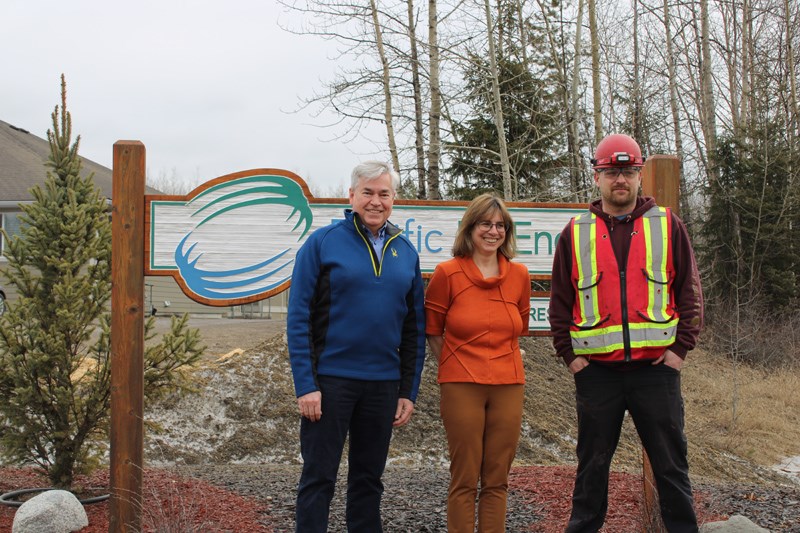Pacific BioEnergy has closed its doors after more than 28 years of operations in Prince George.
“Last night at 4 a.m. we did shut down the plant on a permanent basis,” said PacBio CEO John Stirling, at a press conference Friday in front of the PacBio wood pellet plant on Willow Cale Road.
“We did not lay people off suddenly and send them home, we set a target and we successfully achieved that target last night, and we could only do it that way because we trust our team.”
The company announced it would permanently close its wood pellet plant back in December 2021, stating it had reached an agreement to assign some of its assets, including the wood pellet long term sales contracts, to the Drax Group.
The PacBio closure means the loss of 55 direct jobs and Stirling noted the plant itself will be dismantled and moved elsewhere over the next few months.
Stirling explained that sawmill closures in the region have reduced the volume of available raw materials and increased their cost significantly. Forest fires, landslides, and floods affected the company’s ability to transport products by rail to the export terminal in North Vancouver.
Aron Moscrip worked at Pacific BioEnergey for the past 20 years, starting from the bottom and working his way up to become a production supervisor and team lead.
“I’m taking it day by day,” said Moscrip, of the plant's closure. “It’s a bit emotional. I’m not 100 per cent sure [what I will do next]. I’ve spent half of my life here so we will see.”
Vice president of finance and corporate development, Karen Staahl, has been working for PacBio for the past 13 years and said she will be staying on for a few more months to help transition employees.
“We are fortunate to have the opportunity to really wind down in an orderly fashion and we are proud of the work we have done to support the team here with regard to outpatient counselling and financial planning services, so we are working really hard right now to make sure everyone finds a really good job leaving here so that is the focus for the next few months.”
PacBio began in 1994 with a vision to take residual fibre from sawmills that were once disposed of in beehive burners and turn that material into carbon-neutral renewable fuel to replace coal and fossil fuels.
Stirling said PacBio did a lot of creative things to increase the scope of fibre supply like harvest forest slash material and dead burnt pine from the Bobtail Lake fire, but that a lot of change is needed in the forest industry to keep B.C. competitive.
“It is difficult work and it is different to how the industry has typically worked before, so not enough credit or value has been put on that to sustain the future and that has got to change.”
Stirling said that despite the challenges PacBio has faced, there is still a robust market for wood pellets.
“There is a viable long-term industry, but we compete against the rest of the world now,” said Stirling, adding that PacBio tried to find ways to broaden the fibre supply, but it was an uphill battle against how the industry works.
“Our whole business was built on not wasting fibre,” said Stirling. “Don’t burn sawmill residuals, don’t burn forestry slash — of which there are millions of tons in this province, but it is expensive to get to and we don’t get a lot of help getting there — so that has been the tough uphill battle that we’ve had, and it is going to continue.”
Stirling said PacBio has strong ties to the Prince George community and has had some very good partnerships over the years that have been instrumental for the business.
“We have had tough days where it’s emotional and people are sad and disappointed about what has happened, but we have pulled together and accomplished a tough job safely and effectively and I can’t be more proud of that so our team has really pulled together and done a super job in a tough situation.”



